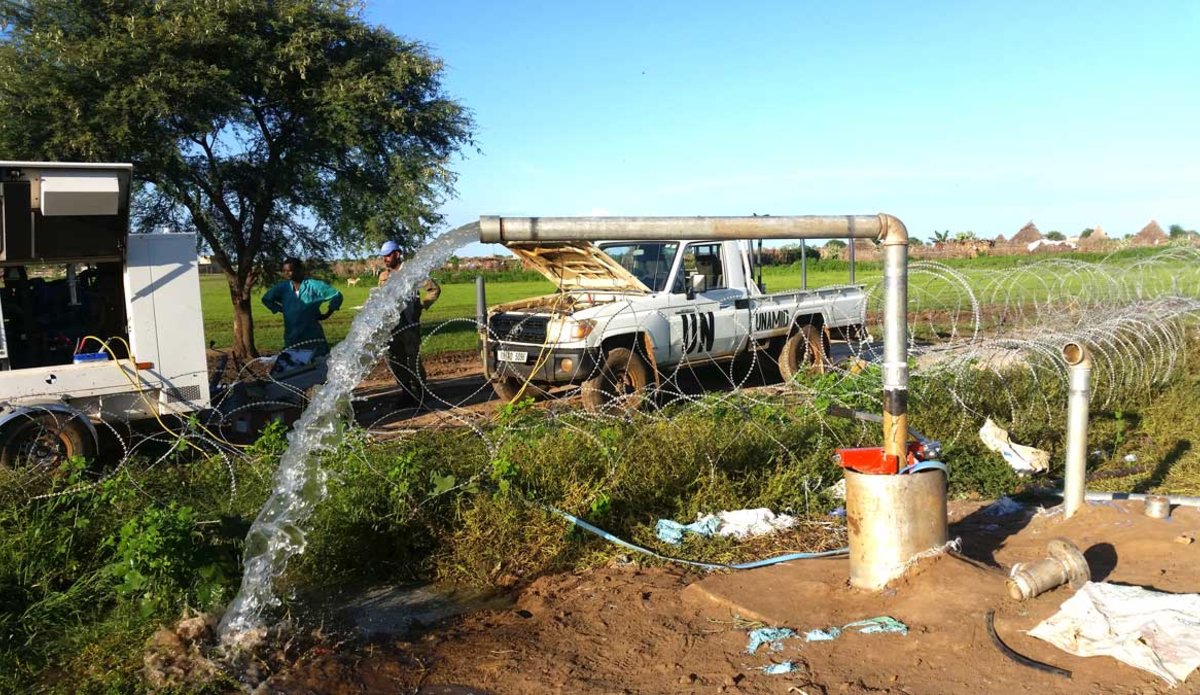UNAMID continues implementing innovative environmental protection measures across Darfur
By Salah Mohammed, UNAMID
UNAMID’s Water and Environmental Protection (WEP) Unit works every day to implement innovative, sustainable environmental protection measures across Darfur. These initiatives are aimed at reducing and managing the risks associated with climate change across the region.
A mainstay of WEP’s environmental programme here includes greening initiatives which combat desertification and address the occurrence of droughts, floods and other extreme ecological imbalances. In this regard, UNAMID WEP has established ten nurseries producing tree seedlings and rehabilitated another similar venture for the North Darfur Agricultural Research Centre (ARC) with a production capacity of 50,000 seedlings per year. In addition, the Mission has signed memoranda of understanding (MoUs) with the National Forestry Corporation (NFC) to meet the high demand of seedlings in North, South, West and Central Darfur.
As of February 2016, a total of 330,000 trees, which include both drought-resistant and fruit trees, have been planted in the aforementioned locations across Darfur. NFC uses funds derived from the sale of these seedlings to establish nurseries in remote locations for easy access by the local communities. This strategy facilitates a collective approach toward increased vegetation cover in Darfur, enhances the carbon dioxide uptake, and thereby combats global warming.
Lack of adequate access to water for all is one of the main non-political drivers of the ongoing conflict in Darfur. Keeping this in view, to facilitate the harvesting of rainwater, WEP has constructed infrastructure at the Mission’s headquarters in El Fasher, North Darfur; Nyala, South Darfur; Zalingei, Central Darfur; and El Geneina, West Darfur, which has the capacity to harvest some 5.3 million litres annually. Such rainwater harvesting reduce damages to expensive equipment and buildings caused by flood water. Moreover, harvested water functions as a water supply security measure as well as a source of clean water when boreholes become inaccessible due to flooding during the rainy season.
Furthermore, the Mission has also installed 122 wastewater treatment plants at its camps across Darfur. These use an activated sludge treatment process to treat wastewater generated in UNAMID’s various locations to a level acceptable for reuse as recommended by the World Health Organization (WHO). This treated wastewater is used as a substitute for fresh water to meet the non-potable water demands of the Mission’s personnel--toilet flushing, tree planting, car washing, construction works, dust control and firefighting—and has reduced the need for fresh water in the Mission’s camps where these systems have been installed, by some 40 per cent. The trees planted near UNAMID’s camps are also watered with treated wastewater and assist the Mission in reducing its carbon footprint and reduces the encroachment of desert.
To further eliminate pollution of groundwater and promote the concept of ‘waste to wealth,’ a composting facility, which uses the organic part of the waste stream from UNAMID’s headquarters, and a briquetting capability, which converts shredded paper into briquettes for cooking, have been established at the Zam Zam waste disposal site near El Fasher, North Darfur. To date, 100 informal waste pickers and 60 students from El Fasher University have been trained. Some 4 cubic meters of compost is produced weekly by the local community from food waste and sold to farmers to use as natural fertilizers on their farmlands. Such training activities enhance crop production as well as the purchasing power of people.
Moreover, the abundant sunshine in Darfur provides a good source of renewable solar energy, which can be used to replace fossil fuel for power generation. Recognizing this potential, UNAMID installed 600 solar street lights with in its camps, 256 solar water heaters, 4 solar borehole pumps and solar farm for Communication and information technology equipment’s. Through the use of solar energy for power production, diesel fuel consumption and carbon dioxide emissions responsible for global warming has been reduced.
UNAMID continues to evaluate and monitor its environmental practices to ensure that both its staff members as well as the Darfuri people benefit from good practices designed to ensure development and economic growth in this conflict-torn region.
 UN
UN United Nations Peacekeeping
United Nations Peacekeeping


